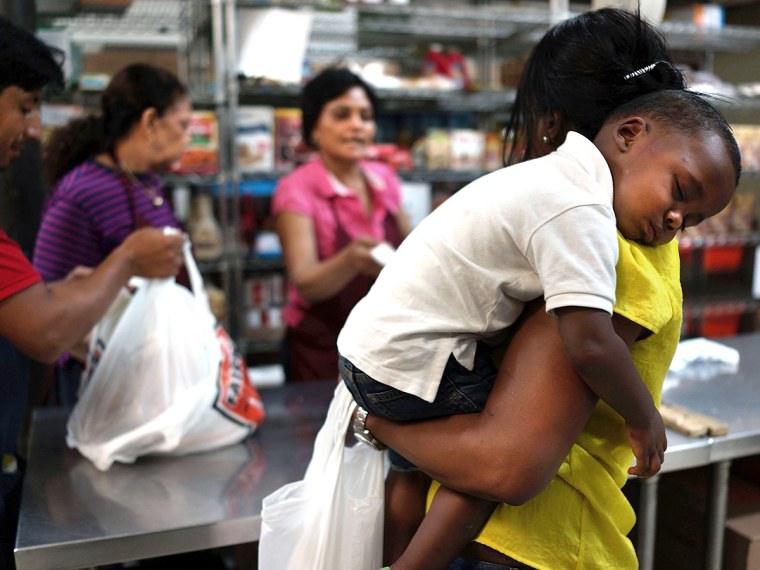Unemployment looms for Merle Burge, a South Carolinian whose employer, a vacation rental company, will close its doors before the month is out.
"At the end of the summer, we were told our company is shutting down," Burge told MSNBC. "My last day is September 25. So if I cannot find another job, my only recourse is to apply for unemployment and apply for food stamps. I live by myself, so I have no other income."
Burge is 55—"Right at the age when they're not hiring you," she joked—and future employment prospects look dim. She might be able to temporarily make ends meet on a combination of SNAP benefits (Supplemental Nutrition Assistance, or food stamps), unemployment insurance, and credit card purchases, but "everything is unknown right now," Burge explained.
She isn't the only SNAP recipient facing uncertainty. The House of Representatives is expected Thursday to take up a proposal which could make somewhere between 4 and 6 million Americans ineligible for full SNAP benefits, according to an analysis by the Center on Budget and Policy Priorities. Called the Nutrition Reform and Work Opportunity Act, the law would reduce SNAP funding by $40 billion over the next decade—nearly double the $20.5 billion which House Republicans originally tried to cut out of the food stamp program two months ago.
The full text of the legislation is not yet available, but House Majority Leader Eric Cantor, R-Va., has dropped some hints as to where the additional $19.5 billion in cuts might be found. In a memo distributed to House Republicans on Friday, Cantor said the bill "restores the intent of the bipartisan welfare reforms adopted in 1996 by ensuring that work requirements for able-bodied adults without children are enforced—not waived—and eliminates loopholes exploited over the last few years to avoid the program’s income and asset tests."
Here's what that means: Current federal law says that able-bodied adults without dependents (ABAWDs) are only eligible for year-round SNAP benefits if they are either employed or enrolled in an eligible workfare or job training program. Those ABAWDs who do not meet the requirement are only eligible for three months' worth of food stamps every three years. Yet the federal government often waives this requirement and allows ABAWDs to receive full benefits regardless of their employment status, because very few states actually operate the programs they would be required to enter. The current Republican proposal would eliminate these federal waivers—causing as many as 4 million people to lose full eligibility—and prohibit states from relaxing some of the federal government's other eligibility rules, as most of them currently do.
The proposed changes are "shocking," according to Margarette Purvis, president and CEO of Food Bank For New York City, one of America's largest food banks.
"In New York City alone, if these cuts go through, we are talking about in a single year having 76 million meals be gone," said Purvis. "[That] is more than what we distribute in a year."
Traditionally, SNAP funding is reauthorized as part of every farm bill, a type of omnibus legislation passed by Congress every five years or so. In June, the House voted down a farm bill which would have cut food stamps by $20.5 billion over the next decade; Democrats uniformly opposed the cuts, saying they were too harsh, while some Republicans voted against the bill because they believed it was not harsh enough. In response, House leadership split the bill in two, turning SNAP funding into a separate piece of legislation. The new, consolidated food stamp legislation, with its $19.5 billion in additional cuts, appears designed to woo back conservative defectors, so the Republican majority can pass the bill on a strict party-line vote. If the House does approve those cuts, they could be folded back into the farm bill during conference committee.
"Say the Senate farm bill contains $4 billion in SNAP cuts and the House farm bill that went down contains $20 billion, so now you’re trying to conference something between $4 billion and $20 billion,” said a spokesperson for Rep. Jim McGovern, D-Mass., in July. “But what happens if the House Republicans bring a $40 billion cut? Now you’re conferencing between $4 billion and $40 billion, which is a lot worse.”
The Senate version of the farm bill does indeed include about $4 billion in cuts. But even if the Congress did not cut food stamps at all, funding is expected to automatically decrease by about $5 billion over the next year alone.
"Doing nothing is not an option, and these cuts are not an option," said Purvis. Food banks, she said, cannot possibly compensate for the damage done.
